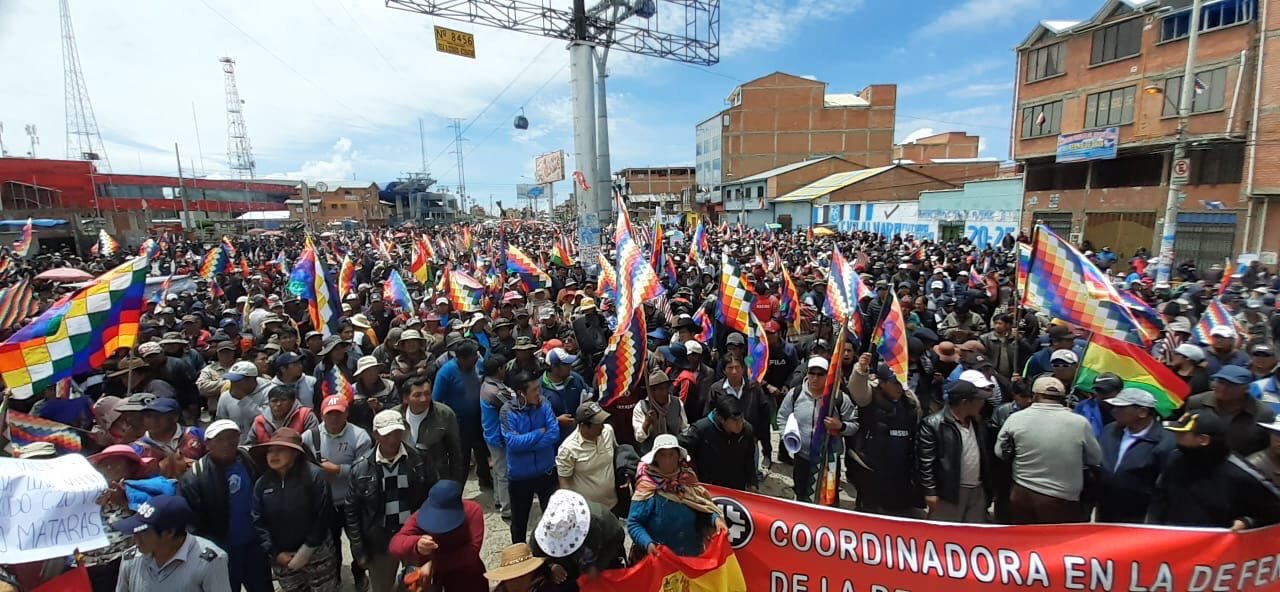
At least six were killed and some 20 injured when Bolivian army and National Police opened fire on protesters demanding the reinstatement of deposed president Evo Morales in the working-class city of El Alto. Protesters had been blockading the entrance to Senkata gasworks and oil refinery in the city for three days on Nov. 19, when troops backed up by armored vehicles attempted to clear the gates, allowing tanker-trucks through to supply gasoline to La Paz. Bolivia’s official rights agency, the Defensoría del Pueblo, confirmed the death of three in the incident, but local media are putting the toll as high as eight.
Newly appointed de facto Defense Minister Luis Fernando López denied that has troops had “fired a single bullet.”
The blockade of the Senkata plant, run by state company YPFB, has caused fuel shortages in La Paz, and cut-backs in public transport. The hydrocarbons minister, Víctor Hugo Zamora, also appointed by the new de facto regime, appeared to justify the violence, saying, “Except for use of the gas, we seek to avoid aggression.” (Excepto el uso de gases, pedimos que se evite la agresión.) (Pagina12, Argentina, Nov. 21; Pagina12, InfoBae, Argentina, Ambito, Argentina, EuropaPress, Spain, Nov. 19; Eju!, Santa Cruz, Nov. 15)
Tensions have been mounting in El Alto, a stronghold of support for Evo Morales. The night before the clash at Senkata, presumed Morales supporters set fire to the city’s municipal building and the home of Mayor Soledad Chapetón, an Aymara woman elected in 2015 as El Alto’s first female mayor—but with the opposition Unidad Nacional party. (La Razón, La Paz, Nov. 19; Pagina Siete, La Paz, Nov. 16) After the blockade was broken at Senkata, El Alto’s Federation of Neighborhood Committees (FEJUVE) announced an occupation of Bolivia’s international airport, which is in the city. (Los Tiempos, Cochabamba, Nov. 20)
Several other protests demanding Morales’ reinstatement have been reported from across Bolivia. Campesinos blocked the main road through Cornelio Saavedra province of Potosí department for several days, halting all traffic to the southern city of Sucre. They agreed to lift the blockade Nov. 20, pending outcome of a regional campesino assembly to decide on the proper tactics to press their demands. (Correo del Sur, Sucre, Nov. 20)
De facto interim president Jeanine Añez on Nov. 20 submitted a bill calling for new elections, although an actual date for new polls was not included in the proposal. The bill calls for a “credible and professional” election body “in order to pacify the country and redirect democratic institutionality.” Even after the resignation of several of his supporters following the transfer of power on Nov. 10, Morales’ Movement Toward Socialism (MAS) continues to hold a majority in both houses of the Plurinational Legislative Assembly. However, the MAS appears itself divided on whether to accede to new elections.
In response to the violence in El Alto, MAS lawmaker Monica Eva Copa Murga called on both the military and supporters of her own party to demobilize. “We do not want more deaths, we do not want more blood,” she said, flanked by other MAS lawmakers. (Reuters, AP, Nov. 20; Reuters, Nov. 19)
From Mexican exile, Morales invoked Añez and two of his key opponents in a tweet (our translation): “The dictatorship of Áñez, Camacho and Mesa has already caused 30 deaths and dozens of injuries in repression by the Police and Armed Forces. I have called upon the CIDH [Inter-American Human Rights Commission] and the UN to denounce and stop this massacre of indigenous brothers who ask for peace, democracy and respect for life in the streets.”
The Defensoría del Pueblo (still led by Morales appointee Nadia Cruz) maintains a count on its website of deaths in the conflict, now standing at 32—but since the contested elections of Oct. 21, not since the removal of Morales on Nov. 10.
Photo via Carwil Bjork-James




